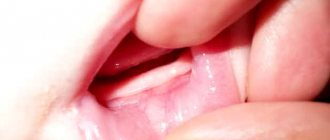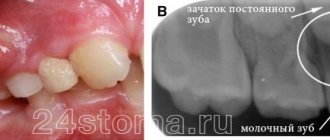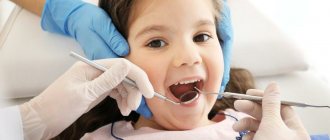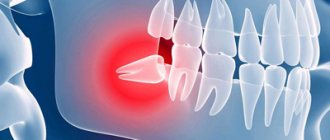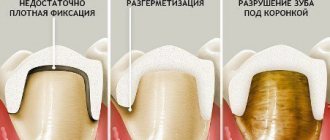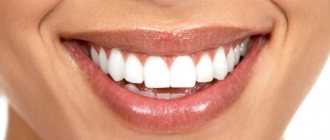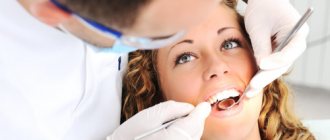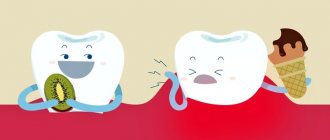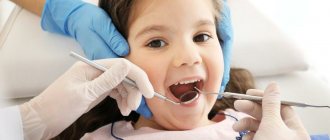» Signs » What to do with a lost tooth and what signs are associated with it
0
3941
Article rating
Tooth loss is a life process that all people experience. If a child’s tooth falls out, this is primarily due to the structure of the human body, which involves the replacement of milk teeth with permanent ones. What causes tooth loss in adults?
Tooth fell out
Most often this is due to a lack of calcium in the body, mechanical injuries or illness. In this situation, you should contact your dentist. But folk signs and beliefs will tell you what to do with a lost tooth.
Why do teeth fall out
Each tooth is located in its own socket and is securely held in it thanks to the periodontium. This is a whole complex of tissues, which includes root cement, dentogingival ligament and alveolar bone. They perfectly perform supporting and holding functions until inflammatory processes begin in the tissues. As a rule, the latter occur due to poor oral hygiene.
Within two hours after brushing your teeth, plaque begins to accumulate on them. It consists of food particles, saliva, the minerals it contains, and bacteria. There are especially many of them near the gums and between the teeth. Over time, plaque mineralizes and turns into tartar. It is the main cause of most dental diseases, including those associated with periodontal disease.
Inflammation of the tissues holding the tooth in the socket can be quite severe against the background of metabolic disorders, diabetes mellitus, thyroid disease, hypovitaminosis and osteoporosis.
Folk signs associated with baby teeth
The most popular character in modern children's folklore is the tooth fairy. The source of this character's appearance is European folk legends. In Slavic mythology, the role of such a fairy for children is played by a mouse, which comes running for milk incisors and leaves money or gifts for them.
Every child knows where to put a lost tooth - it needs to be put under the pillow.
In this case, at night the cutter will take the good spirit and leave a coin. Naturally, the exchange process falls on the shoulders of the parents. According to some beliefs, evil spirits come for teeth, and if you do not carry out such a ritual, you can seriously harm the future of your children. If the spirit manages to get to the tooth first, this will give him some power over the child’s fate. For the same reason, a tooth cannot just be thrown away.
In European countries, lost baby teeth are given to the will of fire. Parents believe that in this way they strengthen their children from illnesses and troubles in life. According to English beliefs, an unfinished ritual of burning a tooth can lead to the child growing a dog’s jaw, and after death he will not be able to go to hell or heaven, forever remaining between heaven and earth.
Another Slavic custom is to give a child’s tooth to mice for safekeeping, throwing it on the floor. It is believed that rodents are able to give a child their strong jaws and protect them from dark sorcery. There are also several signs associated directly with the loss of children's teeth:
- A child with sparse teeth is prone to adventures and mischief.
- If the baby's upper canine grows in first, this promises him death in his early years.
- Children were forbidden to lick the site of a lost tooth - it was believed that this would heal the wound and prevent a new tooth from growing.
- In the old days, babies who were starting to cut their teeth were given a wolf's fang to chew on. This was done so that the child’s jaw had a wolf-like grip.
Causes of tooth loss in adults
The acids contained in plaque over time destroy the hard tissues of the teeth and provoke inflammatory processes in the gums. This is how diseases begin that cause teeth to fall out in adults.
- Periodontitis Long-existing plaque attaches to the teeth and begins to mineralize. Gradually it goes down below the gum, causes inflammation and begins to destroy the ligament that holds the tooth in the bone. As a result, the periodontal ligament and bone tissue are destroyed, and the tooth becomes mobile.
- Periodontitis If caries is not treated, the infection gradually penetrates first into the dentin, then into the pulp of the tooth, and then reaches the periodontal tissues. This inflammation leads to destruction and subsequent loss of teeth.
In what cases does restoration not make sense?
Many of our patients ask this question. We always answer objectively when it is really worth investing not in restoring your own tooth, but in installing an implant. Of course, there is no clear solution, because each clinical case is individual, but there are many situations where we know for sure that installing an implant will be a much better solution for the patient, both for clinical and financial reasons.
- If the front tooth has already undergone endodontic treatment several times (especially if the treatment was carried out under a microscope), and there are still inflammatory changes in the area of the root apexes, there is no point in treating the root canal again, but it is better to remove the tooth and insert an implant.
- A similar situation occurs when we have a severely damaged coronal part of the tooth due to a subgingival fracture of the tooth, or when a carious cavity reaches the root of the tooth and prosthetic reconstruction using a coronal inlay and a prosthetic crown is very doubtful. In such a situation, it is also better to consider the option of implantation.
Tooth fell out: what to do
The loss of even one tooth leads to changes in the dentition and disruption of the dental system. As a result, a number of problems can arise:
- improper jaw closure
- increased stress on healthy teeth
- overload of facial muscles and temporomandibular joints
- headache
If all the teeth have fallen out, the proportions of the face change, and the person seems older than he really is. Therefore, in case of partial or complete adentia, it is necessary to restore the integrity of the dentition as quickly as possible. One of the most effective methods is implantation.
The artificial root performs all the functions of a real one and is securely fixed in the bone tissue. An aesthetic crown is installed on it. Thanks to the high precision of manufacturing, it is completely indistinguishable from real teeth.
Implants will help restore the functioning of the dental system, even if all teeth have fallen out, thanks to the All-on-4 and All-on-6 prosthetic methods. Implantation is the only way to completely restore the dentition without the sensation of artificial teeth.
The loss of even one tooth negatively affects the functioning of the dental system, so it is better to promptly seek help from a dentist. He will find out the cause of tooth loss in adults and prescribe effective treatment that will help avoid functional changes.
Additional beliefs about teeth
You can determine your character by your teeth, and your health by their condition.
For example, a person with large gaps between his teeth is prone to lying, and frequent placement speaks of an amorous nature. Signs about a lost tooth say that if a chip occurs during a fight or accident, then the person is likely to change jobs. Grinding your teeth while eating means being invited to dinner, and only a good-natured person grinds his jaw with anger. People of all times and nations have attached great importance to signs. Everyday life, and sometimes the whole life, was woven from them. In the past, medicine was very poorly developed and with the help of superstitions, people tried to maintain their health, protect themselves from troubles and misfortunes, attract wealth to their homes, and protect children from troubles.
Superstitions did not appear out of nowhere. First, patterns were identified between cause and effect, as a result of which a sign appeared.
Following the example of our ancestors, knowing what to do with an extracted tooth, you can also protect yourself from mental troubles. The main thing for a person is to maintain his energy in full, without wasting it on trifles. It is energy that makes a person healthy and elevates him to the rank of long-livers. With the help of hair, nails and teeth, sorcerers can cause irreparable harm to their victims, so it is better to use ancient signs.
How to protect teeth from falling out
- Brush your teeth regularly and properly To maintain oral health, it is important to brush your teeth twice a day - morning and evening. For best results, use floss or irrigator, as well as rinse aid.
- Go for preventative examinations to the dentist. This will help maintain the health of your teeth and gums, prevent the occurrence of diseases, and also take the necessary measures in a timely manner.
- Come regularly for professional oral hygiene. After this procedure, your teeth will become smooth and shiny, tartar and the bacteria living in them will disappear, and the condition of your gums will improve.
- Eat right Your diet should include foods rich in microelements and vitamins that are important for health.
- Give up bad habits Smoking and alcohol negatively affect oral health.
Proper oral care, professional hygiene and regular dental checkups will help prevent tooth loss. But if you encounter such a problem, we recommend that you do not delay your visit to the doctor. He will diagnose, prescribe treatment and help restore the integrity of the dentition using reliable techniques.
Dental restoration methods
The clinics of the Amazing Prices Dentistry network in Moscow use materials for prosthetics of front teeth that ideally reflect the shape and color of natural enamel. Even the most difficult cases of chipped, abnormally pigmented or broken teeth can be easily corrected with one of the following methods to restore a beautiful smile.
- Veneers
The most beautiful restorations of the front teeth are performed with veneers. These are microprostheses in the form of thin ceramic overlays that are attached to the outside of the teeth. Thanks to the diffusion of natural light into the ceramic layer, the teeth look exceptionally natural. Veneers can be used if the enamel is sufficient in quantity and quality. This method is designed to hide a wide variety of dental damage. It is important to understand that veneers are installed in a complex - eight (minimum six) overlays for each row of teeth. Therefore, if the problem is with just one tooth, this option is not always advisable to use. Any malocclusions, tooth decay, or gingivitis must be treated before veneers are placed. It is also recommended to whiten your teeth before prosthetics using veneers.
- Single crown
Restoring a tooth after root canal treatment or a fracture of the coronal part can be performed using a single prosthesis - a crown. It covers the tooth, restores its natural appearance, strengthens it and provides the same comfort as natural teeth. The material you can choose is solid ceramics - the best option for prosthetics of front teeth, premium zirconium dioxide or standard metal ceramics. Crowns made of solid ceramics are very aesthetic and therefore are often used in dentistry to restore the frontal area.
- Bridge prosthetics
Another popular direction in dental practice, which is used if the front tooth has fallen out or been removed for medical reasons. With the help of a bridge, you can restore not only one missing unit, but also two or three missing teeth in a row. Materials for bridges are solid ceramics, metal ceramics, zirconium dioxide. The doctors at Amazing Price Dentistry will help you choose an option that will suit you in appearance, durability and cost.
Sign up for front teeth restoration
Chips and caries should not be taken lightly, not only for aesthetic reasons, but also for health reasons. Repairing a cracked or chipped tooth does not cost much, but if neglected, the cost of restoring the tooth can add up significantly. Thus, at Amazing Price Dentistry, the cost of veneering is 12,500 rubles per tooth, a metal-ceramic crown made in Germany is 3,450 rubles. Zirconium and all-ceramic dentures – from 10,000 rubles per tooth. Implantation of one tooth with prosthetics – from 18,000 rubles.
Veneers for front teeth
Veneers: pros and cons
Scientific approach
If folk wisdom clearly indicates that it is impossible to keep fallen or pulled out teeth at home, then modern science has a different opinion. From a hygienic point of view, they are absolutely safe, since they do not contain any traces of flesh. They can be equated to such parts of the human body as nails and hair: esoteric beliefs prescribe burning them, since through these biological materials one can influence their former owner, but the vast majority of citizens still throw them in the trash.
However, given the latest scientific discoveries, thoughtless disposal of baby teeth is a very irrational act. Recently, British scientists began extracting stem cells from their pulp. Frozen material can be stored in a special jar for about 30 years and, if necessary, used to treat cancer, diabetes, stroke and other serious diseases.
Unlike materials obtained from umbilical cord blood, stem cells from baby teeth are more viable and are used to treat not only blood diseases, but also diseases of internal organs, including the brain. In addition, they can be extracted not only at birth, when there are already enough worries and expenses, but at a later age: from 6 to 12 years.
Teeth and karma
Eastern sages have long been confident that the condition of one’s teeth can determine a person’s karma and his future destiny. Thus, straight incisors were considered a sign of well-being and the absence of any complex life conflicts, while crooked ones testified to a complex, tangled fate. Those with rare teeth were expected to have an easy disposition and the ability to please the opposite sex, while large, prominent incisors spoke of the evil and harsh character of their owner.
Among the Slavs, these parts of the body symbolized the connection with the clan, with the front incisors reflecting the connection with the parents, and the fangs and chewing teeth are the heritage passed on to the person by more distant relatives. The upper jaws symbolized male ancestors, while the lower jaws symbolized female ancestors. Wisdom teeth were held in special esteem: it was believed that they grow only in spiritually mature individuals who are under the protection of their family. The reluctance of many people, especially those of the old school, to remove them stems from the belief that, having lost this part of the body, a person also loses the spiritual protection of his ancestors. In order to prevent the outer teeth from deteriorating longer and remaining in the mouth, they were even specially charmed.
Changing a child's baby teeth was also considered a sacred event. It usually occurs around 7 years, and it is after this period that the body is completely renewed and restructured. According to Eastern traditions, at this time the child’s karma changes, and you need to behave with him as carefully and carefully as possible, setting him up for a happy future. After 7 years, by the age of 14, the child completes the change of teeth and becomes a teenager. And after another seven-year cycle, by the age of 21, a person becomes an adult, his wisdom teeth erupt, and he is given another chance to change karma.
Children and adults
Lost teeth in a child aged 6–8 years is a natural process of changing milk teeth to permanent ones. Most often, the baby loses them in the same order in which they erupted. There is no exact age when this happens, since this condition is individual for each baby, but it happens absolutely painlessly and is safe for the body.
However, if a tooth falls out in adulthood, this is a sign of a serious pathology, which is most often associated with poor hygiene, bad habits and resulting diseases. Delayed treatment and negligent attitude towards teeth care can lead to their loss.
In turn, an incomplete row leads to displacement of the teeth: they move closer together, as if filling the resulting gap. This state of affairs can lead to the following consequences:
- the bite is disturbed;
- cracks form;
- teeth become loose;
- periodontitis develops.
Absence of teeth leads to displacement of the remaining ones and the formation of gaps
There is a misconception that older people always start to lose teeth, but this is not true. The process has nothing to do with age. Teeth can be kept healthy and strong if you take proper care of them, take vitamins, give up bad habits and visit the dentist regularly.
Many mothers wonder which teeth fall out first. Depending on the child’s body, milk falls out at 6 or 7 years of age. The baby loses them in the same order in which they erupted; for example, you can see that the front tooth has fallen out if it erupted first. If the lower incisors erupted first, they will be the first to leave their place.
Is it possible to keep fallen and pulled out teeth at home?
The loss of a child’s first baby tooth is one of the most striking events in every family, because, as a rule, it happens on the threshold of independent life, when school is already looming on the horizon. In memory of this important stage of growing up, parents often strive to preserve the first incisors that fell out, next to the tag from the maternity hospital, the first lock of hair cut, and casts of the baby’s tiny hands and feet. However, according to popular belief, storing teeth at home is strictly not recommended. Let's try to figure out why you can't keep them at home, and whether this is actually true.
